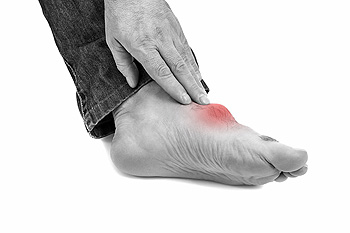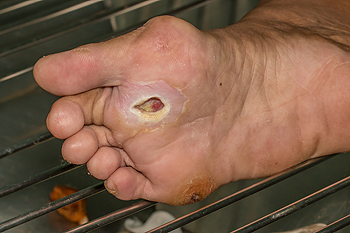January 2020
Gout Attacks May Be Painful
 The medical condition that is known as gout can be uncomfortable. This form of arthritis generally causes severe pain and discomfort in the big toe and surrounding areas. The pain comes from the joints, and is caused by elevated uric acid levels in the blood. Many patients who experience gout attacks equate the pain to needle-like sensations, and it may be painful if anything touches the toe. Symptoms of this condition often include redness and swelling around the affected joints. Research has indicated that this ailment can develop from genetic traits, or from certain foods that are eaten. These can include red meat, shellfish, and drinks that have large amounts of sugar in them. A proper diagnosis can consist of having a blood test performed which may be helpful in determining the amount of uric acid that is present. Additionally, it may be beneficial to use a needle to remove a portion of the crystals from the painful joints. If you have been afflicted with gout attacks, it is suggested that you speak to a podiatrist who can properly treat this condition.
The medical condition that is known as gout can be uncomfortable. This form of arthritis generally causes severe pain and discomfort in the big toe and surrounding areas. The pain comes from the joints, and is caused by elevated uric acid levels in the blood. Many patients who experience gout attacks equate the pain to needle-like sensations, and it may be painful if anything touches the toe. Symptoms of this condition often include redness and swelling around the affected joints. Research has indicated that this ailment can develop from genetic traits, or from certain foods that are eaten. These can include red meat, shellfish, and drinks that have large amounts of sugar in them. A proper diagnosis can consist of having a blood test performed which may be helpful in determining the amount of uric acid that is present. Additionally, it may be beneficial to use a needle to remove a portion of the crystals from the painful joints. If you have been afflicted with gout attacks, it is suggested that you speak to a podiatrist who can properly treat this condition.
Gout is a foot condition that requires certain treatment and care. If you are seeking treatment, contact Brian D. Jackson, DPM from Neuhaus Foot and Ankle. Our doctor will treat your foot and ankle needs.
What Is Gout?
Gout is a type of arthritis caused by a buildup of uric acid in the bloodstream. It often develops in the foot, especially the big toe area, although it can manifest in other parts of the body as well. Gout can make walking and standing very painful and is especially common in diabetics and the obese.
People typically get gout because of a poor diet. Genetic predisposition is also a factor. The children of parents who have had gout frequently have a chance of developing it themselves.
Gout can easily be identified by redness and inflammation of the big toe and the surrounding areas of the foot. Other symptoms include extreme fatigue, joint pain, and running high fevers. Sometimes corticosteroid drugs can be prescribed to treat gout, but the best way to combat this disease is to get more exercise and eat a better diet.
If you have any questions please feel free to contact one of our offices located in Columbia and Pulaski, TN . We offer the newest diagnostic and treatment technologies for all your foot and ankle needs.
Wounds That Don't Heal Need to Be Checked
Can Exercise Help You to Avoid Falling?
 Many elderly people are susceptible to falling. This can be a result of impaired vision, tripping hazards that may be present in the house, or foot ailments that can make it difficult to walk. Research has indicated it may be beneficial to improve conditions in the house which may help to prevent falling. These can include improved lighting, installing grab bars in the shower and toilet area, in addition to performing a gentle exercise routine. This can help to build strength in the body, which could possibly prevent falling. If your feet have been affected by a fall, it is suggested that you consult with a podiatrist who can help you with implementing strategies to prevent falling.
Many elderly people are susceptible to falling. This can be a result of impaired vision, tripping hazards that may be present in the house, or foot ailments that can make it difficult to walk. Research has indicated it may be beneficial to improve conditions in the house which may help to prevent falling. These can include improved lighting, installing grab bars in the shower and toilet area, in addition to performing a gentle exercise routine. This can help to build strength in the body, which could possibly prevent falling. If your feet have been affected by a fall, it is suggested that you consult with a podiatrist who can help you with implementing strategies to prevent falling.
Preventing falls among the elderly is very important. If you are older and have fallen or fear that you are prone to falling, consult with Brian D. Jackson, DPM from Neuhaus Foot and Ankle. Our doctor will assess your condition and provide you with quality advice and care.
Every 11 seconds, an elderly American is being treated in an emergency room for a fall related injury. Falls are the leading cause of head and hip injuries for those 65 and older. Due to decreases in strength, balance, senses, and lack of awareness, elderly persons are very susceptible to falling. Thankfully, there are a number of things older persons can do to prevent falls.
How to Prevent Falls
Some effective methods that older persons can do to prevent falls include:
- Enrolling in strength and balance exercise program to increase balance and strength
- Periodically having your sight and hearing checked
- Discuss any medications you have with a doctor to see if it increases the risk of falling
- Clearing the house of falling hazards and installing devices like grab bars and railings
- Utilizing a walker or cane
- Wearing shoes that provide good support and cushioning
- Talking to family members about falling and increasing awareness
Falling can be a traumatic and embarrassing experience for elderly persons; this can make them less willing to leave the house, and less willing to talk to someone about their fears of falling. Doing such things, however, will increase the likelihood of tripping or losing one’s balance. Knowing the causes of falling and how to prevent them is the best way to mitigate the risk of serious injury.
If you have any questions, please feel free to contact one of our offices located in Columbia and Pulaski, TN . We offer the newest diagnostic and treatment technologies for all your foot care needs.
The Importance of Podiatric Care for Diabetic Patients
 Elevated blood sugar levels may cause foot conditions in diabetic patients. A loss of feeling may develop in the feet, which is referred to as neuropathy, and this can make it difficult to feel any sores or cuts that may be on the feet. An open sore may become infected, and develop into a foot ulcer. If this is left untreated, it may lead to amputation. There are several symptoms that can indicate serious foot conditions in diabetic patients. These can include a tingling sensation, staining on the socks, and the feet may feel cold. It is strongly advised that patients who are afflicted with diabetes are under the routine care of a podiatrist who can help them to efficiently manage this condition.
Elevated blood sugar levels may cause foot conditions in diabetic patients. A loss of feeling may develop in the feet, which is referred to as neuropathy, and this can make it difficult to feel any sores or cuts that may be on the feet. An open sore may become infected, and develop into a foot ulcer. If this is left untreated, it may lead to amputation. There are several symptoms that can indicate serious foot conditions in diabetic patients. These can include a tingling sensation, staining on the socks, and the feet may feel cold. It is strongly advised that patients who are afflicted with diabetes are under the routine care of a podiatrist who can help them to efficiently manage this condition.
Diabetic foot care is important in preventing foot ailments such as ulcers. If you are suffering from diabetes or have any other concerns about your feet, contact Brian D. Jackson, DPM from Neuhaus Foot and Ankle. Our doctor can provide the care you need to keep you pain-free and on your feet.
Diabetic Foot Care
Diabetes affects millions of people every year. The condition can damage blood vessels in many parts of the body, especially the feet. Because of this, taking care of your feet is essential if you have diabetes, and having a podiatrist help monitor your foot health is highly recommended.
The Importance of Caring for Your Feet
- Routinely inspect your feet for bruises or sores.
- Wear socks that fit your feet comfortably.
- Wear comfortable shoes that provide adequate support.
Patients with diabetes should have their doctor monitor their blood levels, as blood sugar levels play such a huge role in diabetic care. Monitoring these levels on a regular basis is highly advised.
It is always best to inform your healthcare professional of any concerns you may have regarding your feet, especially for diabetic patients. Early treatment and routine foot examinations are keys to maintaining proper health, especially because severe complications can arise if proper treatment is not applied.
If you have any questions please feel free to contact one of our offices located in Columbia and Pulaski, TN . We offer the newest diagnostic and treatment technologies for all your foot and ankle needs.








